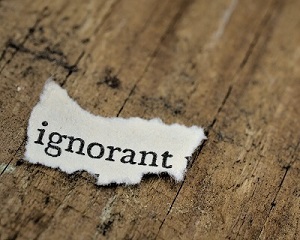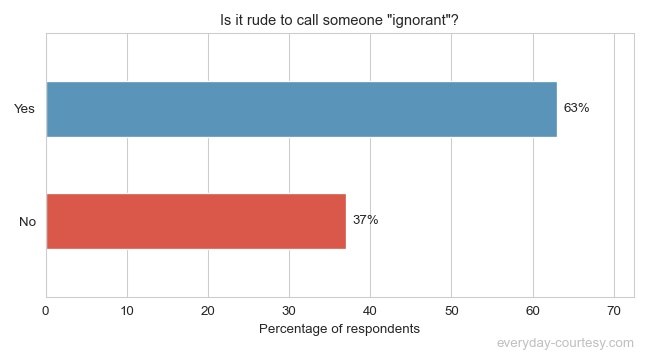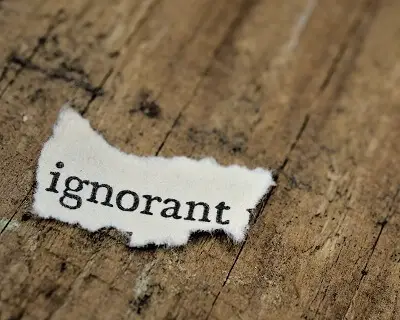We’ve all been there before, whether it’s in a keyboard-clashing Facebook argument, or yet another tumultuous Thanksgiving dinner with some of your rather opinionated relatives.

There’s no doubt about it: the person you’re talking to is not quite intellectually gifted, but you might want to think twice before saying that to their face.
Even though it may be painfully obvious that your companion is lacking in intelligence, it’s a social no-no to call them out on this in public. We surveyed over 100 adults across the US, and the majority agreed that it is rude to call someone ignorant!
Our Survey
We conducted a survey with 105 people based across the US. Without naming any specific situation or scenario, we asked them: is it rude to call someone ignorant?
A whopping 63% said yes, whereas the other 37% said no, go right ahead!

These results are an indicator of a widespread social norm in the US.
In fact, it’s considered impolite to address anyone’s intelligence–and that goes for school teachers, too! Many teachers have gone on blast on social media for calling their students stupid, dull, and just plain dumb, among other things.
Social Norms Overseas
We all know it’s forbidden to discuss politics, religion, or money in casual conversation in the US, but what about other countries? Many other languages and nationalities follow a similar mindset in terms of etiquette.
The word ignorant may not pack as strong a punch in England, but the like-minded mad is considered an insult. In Germany, it’s not uncommon to call someone a “Dummkopf,” or literally, dumbhead!
The Psychology of Insults
It’s easy to say “be kind, do no harm”, but this study begs the question of why anyone would want to call someone ignorant in the first place. Is it impulsivity, or is it perhaps rooted somewhere deeper in our psyche?
Kate Tolson, aka the Energy Gardener, explores this in her article “The Psychology Behind Insult and Criticism” [1]. Tolson connects the modern-day insult back to the innate, tribal survival-oriented mechanisms we still carry to this day.
Intelligence is a good thing, but not when someone from another tribe is smarter than you.
The merciless competition for resources causes us to constantly critique others, whether they’re better or worse off than us.
If you think about it, we do silently judge the people around us all the time. Saying it out loud, however, has some serious consequences as of the 21st century.
Advice From a Founding Father
Maybe calling someone else ignorant makes you feel smarter on some level. It turns out that being the weaker, less intelligent person isn’t as bad as it’s made up to be. This is a well-documented phenomenon in psychology and is named after Benjamin Franklin who recorded his experience in journals.
Franklin found that asking someone to do a favor for you–in effect making you the weaker person in need of help– makes that person more likely to help you again in the future.
Alternatively, asking someone for help makes them like you more, even if it inconveniences them.
Yu Niiya, a researcher at Hosei University in Japan, conducted a study in 2016 to see if this effect holds. She found that despite any possible risks to a relationship, asking for favors (and admitting your shortcomings) does more to strengthen ties rather than break them (Niiya, 2016, pg. 211) [2].
On the other hand, calling someone ignorant can be assumed to harm the relationship.
Context, of course, is a critical component to understanding why it’s rude to call someone ignorant. Let’s look at some common scenarios, and why it’s bad to call someone out.
Example 1: Politics
Pattie is browsing Facebook when she sees an article her cousin Cooper shared on a hot-button political topic. They go to war in the comments, and finally, Pattie says, “You’ll just never understand this issue! You are so ignorant!”
A few weeks later, their families meet up for dinner, and there’s a clear tension in the air.
Ignorance is certainly prevalent in politics, but the term shouldn’t be thrown around lightly. It’s normal to disagree, and sometimes you have to leave arguments in a stalemate.
Pattie should have probably avoided calling her cousin ignorant for his political opinion, as this only created a harsh divide. Exceptions can be made for blatant hatred or prejudice, which is most certainly ignorant.
Example 2: Languages
Sera is a tutor at her college’s academic success center. She sits down with Andre, a foreign exchange student from Italy who has brought an essay he’s struggling with. Sera notices several grammatical and spelling errors. “You’re so ignorant,” she tells Andre. “You must have the intelligence of a fourth-grader!”
Not only was this exchange rude, but completely unwarranted. It’s clear that Andre’s first language isn’t English, so mistakes are bound to happen. Just because Andre doesn’t speak or write perfect English, doesn’t mean he isn’t intelligent! In Italy, Andre is at the top of his class and has numerous awards for his academics.
If you’re tempted to call someone ignorant, consider that you shouldn’t base your opinion of someone on one small factor.
As Albert Einstein once said, “Don’t judge a fish by its ability to climb”.
Example 3: Education
Roman is at the coffee shop catching up with some old friends from high school, they ask him how college is going. He replies, “I’ve been so busy studying organic chemistry. We’re working on cycloalkanes right now.” His friends look at each other and say, “What is that? It sounds hard!”
Roman laughs. “You guys don’t know what cycloalkanes are? Wow, no wonder you didn’t go to college. You’re so ignorant. You couldn’t handle my classes.”
The proper reaction to Roman’s response, according to TikTok, would be “weird flex, but okay.” Clearly, Roman is attempting to impress his friends by showing them how hard his classes are, but he does so by unnecessarily calling them ignorant.
His friends don’t walk away thinking about how smart Roman is.
Instead, they walk away thinking how rude he is (and perhaps now a little doubtful of their own intelligence).
Social Cue or the Right Thing to Do?
When in doubt, it’s best to hold your tongue and never call someone ignorant. There are exceptions to be made, such as blatant racism or prejudice, but those exceptions will (hopefully) be rare.
Sources:
[1]: https://medium.com/@katetolson/the-psychology-behind-insult-and-criticism-dcf3d73bb32c
[2]: https://pubmed.ncbi.nlm.nih.gov/26392141/

Matt Vargas is an author and public speaking coach with a degree in sociology and more than ten years of practical experience. Matt is responsible for the empirical surveys at everyday-courtesy.com, is a passionate recreational musician, and blogs here about his experiences in the field of interpersonal communication.

